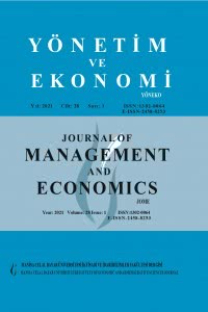İş Modeli İnovasyonu İle Rekabetçi Bir Avantaj Yakalamak
Dünyada ve Türkiye’de iş modelini değiştirmek suretiyle hayatta kalan ve pazar payı ile karını artıran pek çok şirket mevcuttur. İş modeli inovasyonu, krizden ve resesyon dönemlerinden ve diğer acil tepki gösterilmesi gereken durumlardan kutulmanın da, pazar payını artırmanın da kar elde etmenin de en iyi ve geçerli yoludur. Bu çalışmada işletmelerin iş modeli inovasyonu ile rekabetçi bir avantaj yakalamaları için dikkate alması gereken hususlar tespit edilmiştir.Bu tespitlerin yöneticiler tarafından dikkate alınması, çevresel ve/veya örgütsel faktörlerden kaynaklanan krizlere karşı işletmelerin başarı ile çıkmasına yardımcı olacaktır.
Anahtar Kelimeler:
İş Modeli, İş Modeli İnovasyonu, Kriz.
İş Modeli İnovasyonu İle Rekabetçi Bir Avantaj Yakalamak
In the world and Turkey there are many companies that both survive and increase their market shares and profits by changing business models. Business model innovation is one of the best and prevailing methods to tackle with the difficulties emerged in crisis and recession periods and the other endangering factors that should be reacted at once as well as to increase market share and to make profit. In this study, some significant points that companies have to consider for taking competitive advantage by business model innovation are indicated. Taking these findings into consideration will help managers to cope with the crises caused by environmental and/or organizational factors.
Keywords:
Business Model, Business Model Innovation, Crisis.,
___
- ANTHONY, S.D., EYRING, M. and GIBSON, L. (2006), “Mapping Your Innovation Strategy”, Harvard Business Review, 84(5), 104-113.
- ALTUN, S. (2008), Turks Caught Success by Innovation, Istanbul: MediaCat.
- ATES, M.R. (2006), Company Doctor 222 Critical Questions, Istanbul: Hayat.
- ATES, M.R. (2007), Innovation Saves Lives, Istanbul: DoganKitap.
- ATES, M.R. (2008), “Company Doctor”, Capital, 2008(10), 60-61.
- AUGUSTINE, N.R. (1995), “Managing the Crisis You Tried to Prevent”, Harvard Business Review, 73(6), 147-158.
- BAYIKSEL, S.O. (2008), “When should Business Model be changed?”, Capital, 2008(7), 202-206.
- BEER, M. and NOHRIA, N. (2000), “Cracking the code of change”, Harvard Business Review, 78(3), 133-141.
- BHATTARCHARYA, A.K. and MICHAEL, D.C. (2008), “How Local Companies Keep Multinationals at Bay”, Harvard Business Review, 86(3), 84-95.
- BOWER, J.L. and CHRISTENSEN, C.M. (1995), “Disruptive Technologies: Catching the Wave”, Harvard Business Review, 73(1), 43-53.
- BUYUK, S.S. (2011), “Are Organization’s Objectives Change?”, Capital, 2011(9), 80-88.
- CHAKRAVORTI, B. (2010), “Finding Competitive Advantage in Adversity”, Harvard Business Review, 88(11), 102-108.
- CIRIK, E. (2008), “Those who modify business model prolong the life”, Capital, 2008(4), 118-124.
- COLLINS, J. (1999), “Turning Goals into Results: The Power of Catalytic Mechanism”, Harvard Business Review, 77(4), 70-82.
- DEMIREL, H. (2011), “How have I succeded?”, Capital, 2011(9), 76-77.
- FISK, P. (2008), A customer geniusity: To be a customer centered enterprise, Translator: Aytul Ozer, Istanbul: MediaCat.
- FISK, P. (2010), People, Planet, Profit, Translator: Evren Yildirim, Istanbul: MediaCat.
- FOX, J. (2010), “What do notorious rivals do in difficult times?”, Capital, 2010(11), 170.
- GENC, N. (2004), Management and Organization, Istanbul: Seckin.
- GOVINDARAJAN, V. and TRIMBLE C. (2005), “Building Breakthrough Business within Established Organizations”, Harvard Business Review, 83(5), 58-68.
- GOZUTOK, N. (2009), “Business Model Export is booming”, Capital, 2009(12), 262-270.
- GULATI, R., NOHRIA, N. and WOHLGEZOGEN, F. (2010), “Roaring out of Recession”, Harvard Business Review, 88(3), 62-69.
- IZGOREN, A.S. (2009), MOKS, 5th ed., Ankara: Elma Yayinevi.
- JOHNSON, M.W., CHRISTENSEN, C.M. and KAGERMANN, H. (2008), “Reinventing Your Business Model”, Harvard Business Review, 86(12), 50-59.
- KIM, W.C. and MAUBORGNE R. (2005), Blue Ocean Strategy, Massachusetts: Boston: Harvard Business School Press.
- LINDGARDT, Z., REEVES, M., STALK, G. and DEIMLER, M.S. (2009), “Business Model Innovation: When the Game Gets Tough, Change the Game”, http://www.bcg.com/documents/file36456.pdf (03/01/2011).
- MACIARIELLO, J.A. (2005), The Daily Drucker, Translator: Murat Cetinbakıs, Istanbul: MESS.
- MAGRETTA, J. (2002), “Why Business Models Matter?”, Harvard Business Review, 80(5), 86-92.
- MCGRATH, R.G. and MACMILLAN, I.C. (1995), “Discovery Driven Planning”, Harvard Business Review, 73(4), 44-54.
- MEYER, T.A. (2010), Innovate! How great companies get started in terrible times, New Jersey: John Wiley&Sons.
- ORNEK, A.Ş. and AYDIN, S. (2008), Crise and Stress Management, Ankara: Detay.
- OZGENC, A. (2008), “Overcoming Economic Challenges through Innovation”, Strategy&Innovation, 2008(8), 34.
- PAINE, L.S. (1994), “Managing for Organizational Integrity”, Harvard Business Review, 72(2), 106-117.
- PRAHALAD, C.K. and HAMMOND, A. (2002), “Serving the World’s Poor, Profitably”, Harvard Business Review, Reprint R0209C, 4-11.
- PRAHALAD, C.K. (2008), The Fortune at the Bottom of the Pyramid, Translator: Serpil Demirci, Istanbul: Sistem.
- RIES, A. and RIES, L. (2010), War in the Boardroom, Translator: Asli Kalem Bakkal, Istanbul: Mediacat.
- ROTHMAN, H. (2007), 50 Companies That Changed the World, Translator: Nursan Ustuntas, Istanbul: Neden.
- SIMSEK, M.S. (2002), Management and Organization, 7th ed., Konya: Günay.
- SMITH, N.C., THOMAS, R.J. and QUELCH, J.A. (1996), “A Strategic Approach to Managing Product Recalls”, Harvard Business Review, 74(5), 102-112.
- SUTTON, R.I. (2006), Weird ideas that work, Translator: Handan Balkara, Istanbul: Boyner.
- TAN, B. (2008), “Tata Nano: Process Innovation and Democratization of Movement”, Capital, 2008(2), 61.
- TICHY, N.M. and Bennis, W.G. (2011), Judgment, 2nd ed., Translator: Asli Karasuil Ermis, Istanbul: Marti.
- YAVUZ, H. (2009), “Development strategies, even during a crisis”, Capital, 2009(1), 96-99.
- YILMAZ, A. (2010), “Models of Innovation Definition”, htpp://www.yenilesim.org (14.01.2010).
- YOUNG, J.S. and Simon, W.L. (2009), Steve Jobs, Translator: Selim Yeniceri, Istanbul: Yakamoz.
- ZOOK, C. (2007), “Finding Your Next Core Business”, Harvard Business Review, 85(4), 66-75.
- ISSN: 1302-0064
- Yayın Aralığı: Yılda 4 Sayı
- Yayıncı: Manisa Celal Bayar Üniversitesi İktisadi ve İdari Bilimler Fakültesi
Sayıdaki Diğer Makaleler
Ahmet TANER, Berna ERKAN, H. Ömer KÖSE
Hatice Burcu ESKİCİ, Özgür YENİAY
Karapara Aklama Aracı Olarak Yeni Bir Mali Suç: Siber-Aklama
İhracata Dayalı Büyüme Hipotezi Türkiye İçin Geçerli Mi?
Sürdürülebilir Kentsel Gelişim Sürecinde Kompakt Kent Modelinin Analizi
Örgütsel ve Yönetsel Değerlerin Neden Olduğu Sorun Alanlarının Belirlenmesine Yönelik Bir Araştırma
Yalın Üretim Ortamına Uygun Maliyet Sistemi Seçimi
Telekomünikasyon Sektöründe Çalışan Personelin İletişim Becerileri Düzeylerinin İncelenmesi
